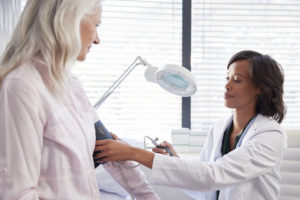
Hypertensive disorders of pregnancy (HDP) can include gestational hypertension and preeclampsia. These well-studied conditions are known as female-specific predictors of cardiovascular disease, which is the leading cause of death in women. Specific menopause symptoms, such as hot flashes, are also known to be indicators of cardiovascular risk.
Even though hot flashes and HDP are both associated with heart disease, there have been limited studies to link the two. Researchers hope this study will help to bridge the information and better understand the connection.
The study published in the journal Menopause has found that high blood pressure in pregnant women may also lead to more bothersome menopause symptoms such as hot flashes. Researchers examined nearly 2,700 women to analyze the connection between HDP and hot flashes to help clinicians better identify women at higher risk for cardiovascular disease.
The study concluded that women with a history of HDP experienced more severe menopause symptoms compared to women without a history of HDP. This was also shown in women without a pregnancy. Researchers additionally found that women with HDP using hormone therapy had significantly more menopause symptoms than women with no such history.
“This large cross-sectional study shows a link between hypertensive disorders of pregnancy and menopause symptoms, both unique to women and predictive of future cardiovascular disease risk. Future studies are needed to determine whether these risks are additive to better inform development of more accurate models for cardiovascular risk prediction in women and strategies for risk reduction,” says Dr. Stephanie Faubion, lead author of the study and NAMS medical director.
Lower Risk with a Healthy Lifestyle
Menopause itself does not cause cardiovascular disease. Researchers believe that this health condition can be diverted by avoiding high-fat diets, smoking, and other unhealthy habits earlier in life. By following a healthy lifestyle from a young age, before pregnancy, it may be possible to lower all risks associated with HDP.
“Menopause isn’t a disease. It’s a natural phase of a woman’s life cycle,” Dr. Goldberg said. “It’s important for women, as they approach menopause, to really take stock of their health.”
More than one in three female adults has some form of cardiovascular disease, and an overall increase in heart attacks among women is seen about ten years after menopause. Therefore, more studies are needed to find treatments to lower the risk of cardiovascular disease.